

Egypt's Muslim Brotherhood Gets a Facelift. Iftar on Istiklal: Public Performance of Religion during the Gezi Protests. Whoever you may be, come Even though you may be An infidel, a pagan, or a fire-worshipper, come Our brotherhood is not one of despair Even though you have broken Your vows of repentance a hundred times, come.

Integrating Islam: Political and Religious Challenges in Contemporary France: Amazon.de: Jonathan Laurence, Justin Va'isse: Fremdsprachige Bücher. Die Geschichte der Muslimbruderschaft. Die ägyptische Muslimbruderschaft, politische und ideologische Heimat des abgesetzten islamistischen Präsidenten Mohammed Mursi, ist die älteste und einflussreichste islamistische Bewegung unter den Sunniten.

Ihre 85-jährige Geschichte ist eine Abfolge von Phasen mitgestaltender Duldung und gewaltsamer Konfrontation. März 1928: Der junge Religionslehrer Hassan al-Banna gründet in Ismailija am Sueskanal die Bruderschaft und ernennt sich zu ihrem Murschid (geistlichen Führer). Zunächst als Wohltätigkeitsorganisation tätig, entwickelt die Muslimbruderschaft bald politische Ziele: die Errichtung eines islamischen Staates und Widerstand gegen den britischen Einfluss.Dezember 1948: Als Ministerpräsident Mahmud Fahmi al-Nokraschi die Auflösung der Bruderschaft verfügt, wird er von einem Aktivisten ermordet. Brutale Unterdrückung ist die Folge. The Future of Political Islam. Were the attacks of September 11, 2001, the final gasp of Islamic radicalism or the opening salvo of a more violent confrontation between Muslim extremists and the West?
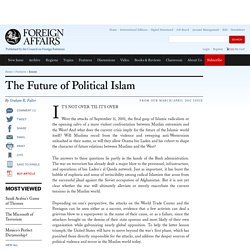
Blowback Revisited. When the United States started sending guns and money to the Afghan mujahideen in the 1980s, it had a clearly defined Cold War purpose: helping expel the Soviet army, which had invaded Afghanistan in 1979.
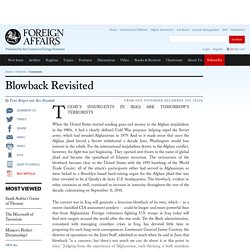
And so it made sense that once the Afghan jihad forced a Soviet withdrawal a decade later, Washington would lose interest in the rebels. The Left and the Jihad. The approaching fifth anniversary of the 9/11 attacks on the United States highlights an issue much in evidence in the world today, but one that receives too little historically-informed and critical analysis: the relationship between militant Islamic groups and the left.
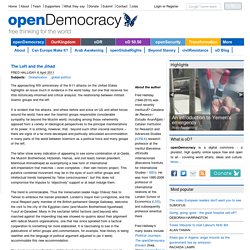
It is evident that the attacks, and others before and since on US and allied forces around the world, have won the Islamist groups responsible considerable sympathy far beyond the Muslim world, including among those vehemently opposed from a variety of ideological perspectives to the principal manifestations of its power. It is striking, however, that - beyond such often visceral reactions – there are signs of a far more developed and politically articulated accommodation in many parts of the world between Islamism as a political force and many groups of the left. How credible is the claim of the failure of political Islam? What is known as political Islam is not in a state of decline, but is in the process of correcting its mistakes and is preparing for a new phase, in the near future, of better governance Whenever the Islamists suffer a setback, or even a small decline in votes, some Western experts monitoring the Islamic Movement's path rush to proclaim to the world that political Islam has failed and collapsed, and that it has come to an end.
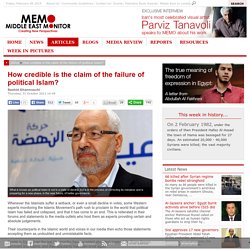
This is reiterated in their forums and statements to the media outlets who host them as experts providing certain and absolute judgements. Their counterparts in the Islamic world and voices in our media then echo those statements accepting them as undoubted and unmistakable facts. Events in Egypt over the last few months have provided abundant material for those theses, seminars and claims, and their popularity has risen once again. But how credible are these claims? The New Islamists. The following is an excerpt from the book The Islamists Are Coming: Who They Really Are, which will be released on April 18 by the U.S.

Institute of Peace and the Woodrow Wilson International Center for Scholars. The longstanding debate over whether Islam and democracy can coexist has reached a stunning turning point. Since the Arab uprisings began in late 2010, political Islam and democracy have become increasingly interdependent. The debate over whether they are compatible is now virtually obsolete. Neither can now survive without the other. In Middle Eastern countries undergoing political transitions, the only way for Islamists to maintain their legitimacy is through elections.
At the same time, democracy will not set down roots in Arab countries in transition without including mainstream Islamist groups, such as the Muslim Brotherhood in Egypt, Ennahda in Tunisia, or Islah in Yemen. The debate over Islam and democracy used to be a chicken-and-egg issue: Which came first? N68YF4S6MM9K6TM.pdf. Political Islam: a Marxist analysis. SINCE THE events of 9/11, the question of political Islam has taken center stage in world politics.
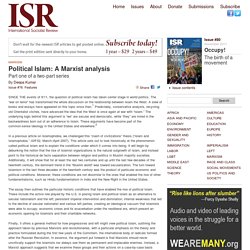
The “war on terror” has transformed the whole discussion on the relationship between Islam the West. A slew of books and essays have appeared on this topic since then.1 Predictably, conservative analysts, recycling old Orientalist clichés, have advanced the idea that the West is once again at war with “Islam.” The underlying logic behind this argument is “we” are secular and democratic, while “they” are mired in the backwardness born out of an adherence to Islam. These arguments have become part of the common-sense ideology in the United States and elsewhere.2 In a previous article on Islamophobia, we challenged this “clash of civilizations” thesis (“Islam and Islamophobia,” ISR 52, March–April 2007). 13569317.2012. 13569317.2012. Muslimbruderschaft. M.
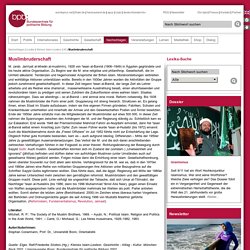
(arab. Jamîyat al-ikhwân al-muslimîn), 1928 von ³asan al-Bannâ (1906–1949) in Ägypten gegründete und bis heute aktive Organisation. Zu Beginn war die M. eine religiöse und philanthrop. Gesellschaft, die im Umfeld säkularist. Tendenzen und hegemonialer Ansprüche der Briten islam. Literatur:Mitchell, R. Autor/Autorinnen:Stephan Conermann, Prof. Quelle: Elger, Ralf/Friederike Stolleis (Hg.): Kleines Islam-Lexikon. Dossier Islamismus Seit 9/11 hat ein Wort Hochkonjunktur: Islamismus. Newsletter Jugendkultur, Islam und Demokratie Wofür stehen Koranverse auf dem T-Shirt? Www.polwiss.uni-erlangen.de/professuren/naherosten/Hintergrund_zur_Muslimbruderschaft.pdf.